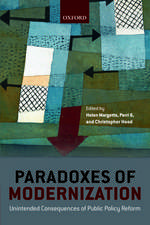The Treasury and British Public Policy 1906-1959
Autor G. C. Pedenen Limba Engleză Hardback – 2 mar 2000
Preț: 560.41 lei
Preț vechi: 839.20 lei
-33% Nou
Puncte Express: 841
Preț estimativ în valută:
107.24€ • 112.19$ • 89.08£
107.24€ • 112.19$ • 89.08£
Carte tipărită la comandă
Livrare economică 22-28 martie
Preluare comenzi: 021 569.72.76
Specificații
ISBN-13: 9780198207078
ISBN-10: 0198207077
Pagini: 596
Ilustrații: 10 figures
Dimensiuni: 164 x 242 x 35 mm
Greutate: 1.01 kg
Editura: OUP OXFORD
Colecția OUP Oxford
Locul publicării:Oxford, United Kingdom
ISBN-10: 0198207077
Pagini: 596
Ilustrații: 10 figures
Dimensiuni: 164 x 242 x 35 mm
Greutate: 1.01 kg
Editura: OUP OXFORD
Colecția OUP Oxford
Locul publicării:Oxford, United Kingdom
Recenzii
Magisterial ... numerous elegant accounts and judicious assessments ... its main strength lies less in the specifics than in the long view and especially in an integrated perspective ... no less important for political historians than it is for economic and administrative historians. All discussions of British politics during this period should be informed by it.
George Peden has been working on the Treasury since the 1970s, and in this book he brings together a vast amount of research to provide, if not a definitive history, at least one that will long dominate the field.
Until now we have had no archive-based institutional history of the Treasury. For this reason alone this volume is to be welcomed and is an important contribution which will be referred to widely and will undoubtedly appear on many reading lists. More than this, few are as well placed to have filled this gap as George Peden, given his long-established authority and knowledge of the workings of the Treasury.
Anyone who writes on British economic policy in the twentieth-century will need to consult this impressive volume. A major institution now has the study its importance warrants. Given the huge influence of the British Treasury, this authoritative study will be an essential reference tool not only for those examining the more recondite areas of the government's financial business but for those concerned with the broad context of British domestic and overseas policy formulation.
Peden handles a mass of material in a masterly way ... he has a gently ironic style with a great talent for apt quotation.
George Peden has been working on the Treasury since the 1970s, and in this book he brings together a vast amount of research to provide, if not a definitive history, at least one that will long dominate the field.
Until now we have had no archive-based institutional history of the Treasury. For this reason alone this volume is to be welcomed and is an important contribution which will be referred to widely and will undoubtedly appear on many reading lists. More than this, few are as well placed to have filled this gap as George Peden, given his long-established authority and knowledge of the workings of the Treasury.
Anyone who writes on British economic policy in the twentieth-century will need to consult this impressive volume. A major institution now has the study its importance warrants. Given the huge influence of the British Treasury, this authoritative study will be an essential reference tool not only for those examining the more recondite areas of the government's financial business but for those concerned with the broad context of British domestic and overseas policy formulation.
Peden handles a mass of material in a masterly way ... he has a gently ironic style with a great talent for apt quotation.


















